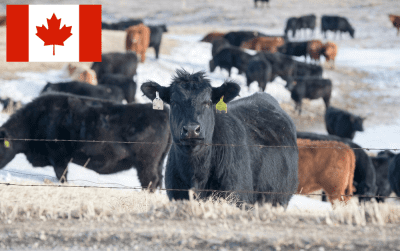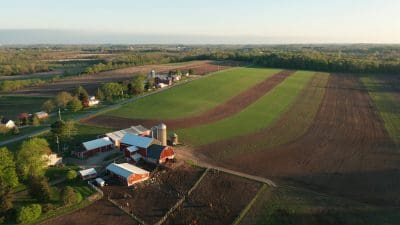Canada’s application to access Australia’s market for chilled and frozen beef has moved a step closer to approval, clearing a key regulatory hurdle.
 On Friday the Department of Agriculture, Fisheries and Forestry (DAFF) released a final report following a long-running biosecurity review and consultation process.
On Friday the Department of Agriculture, Fisheries and Forestry (DAFF) released a final report following a long-running biosecurity review and consultation process.
It found that biosecurity risks associated with importing fresh (chilled or frozen) beef and beef products from Canada to Australia can be effectively managed to meet Australia’s Appropriate Level of Protection (ALOP).
Based on that finding, DAFF has recommended Canada be added to the list of countries that can apply to Australia for market access for fresh beef.
The next step in the process is for DAFF to complete Canada’s Competent Authority Assessment, to determine if Canada’s official animal health, export control, and supervision systems will ensure Australia’s biosecurity and food safety requirements are met.
Sources familiar with the Departmental process told Beef Central it is likely that some of that work has already been completed alongside the earlier review, suggesting a final determination on Canada’s application for market access could be made relatively soon.
US beef access also in focus
Canada’s application also has implications for the United States’ long running bid to regain access to Australia’s market for fresh beef imports.
Australia suspended US beef import access in 2003 when BSE was discovered in the US herd.
The US has made several applications to regain full access to Australia’s market in the past 22 years and is on the list of approved applicant countries which could allow export of beef from cattle born and raised in the US.
 As part of what has been a long-running process, the US requested an Australian assessment be conducted to additionally permit trade in meat from cattle born and raised in Canada and Mexico which is processed and exported from the US.
As part of what has been a long-running process, the US requested an Australian assessment be conducted to additionally permit trade in meat from cattle born and raised in Canada and Mexico which is processed and exported from the US.
DAFF has been conducting that review of fresh beef and beef products imported from the US but including beef sourced from cattle imported to the US from neighbouring Canada and Mexico, which is reflective of the US beef supply chain.
As Beef Central reported in October last year the process has been working through a complex array of issues such as the capacity for individual animal traceability in the US and standards for meat production, food safety, residue risk and other matters.
At the same time the American Meat Institute (AMI) wrote to the US Trade Representative noting that DAFF “had recommended allowing the importation of fresh beef and beef products from the US derived from immediate slaughter, feeder, and breeder cattle born and raised in Mexico and Canada – pending a final food safety risk assessment in the case of beef derived from Canadian cattle”.
It added that the “favorable determination” necessitated a “redoubling of efforts to finally secure access for US beef exports to Australia”.
In the same letter the AMI said Australia continued to restrict access for chilled/frozen US beef with “persistent, unjustified BSE disease-related bans” and urged the US Trade Representative to prioritise efforts to remove restrictions on US beef exports to Australia.
Last year an annual US trade barriers report published by the US Trade Representative under the Biden Government also raised concern about Australia’s strict biosecurity rules blocking the sale of US beef, pork, chicken and other agricultural products.
“The United States continues to press the Australian government to align its import requirements for US fresh beef and beef product exports with World Organisation for Animal Health guidelines for countries with a negligible risk,” the reported stated.
“The United States has provided Australia with scientific evidence demonstrating the safety of US pork products; however, the issue remains unresolved.”
Aus industry supports rigorous biosecurity approach
Industry sources have told Beef Central that while the US may be frustrated with Australia’s progress on its market access request, the industry strongly supports the Australian Government conducting thorough science-based risk assessments to meet Australia’s appropriate level of biosecurity protection as is Australia’s right under agreements in the World Trade Organization and World Organization for Animal Health.
Industry sources also noted that changes in US beef access requests mid-stream had played a large role in prolonging timelines due to the US changing the scope for its technical request, telling Beef Central: “The US had not helped itself by changing its scope following Australia’s initial assessment of animals born and raised in the US – this ultimately resulted in a US amendment to include animals sourced from Mexico and Canada, which has necessarily added more complexity and time required to assess risks.”

I hope that Australia requires the country of origin to be clearly noted. As an aussie i have no desire to buy thawed or frozen canadian meat when we have some of the world’s best cattle and production. I see this as dumping and supermarkets like coles and Woolworths will game it if they are given a chance.
Just to be clear, Paul – both Coles and Woolworths make very clear references to Australian-only in their beef offerings – right down to “100% Australian” and “Australian Beef” retail pack labels on everything from steaks to mince. Editor
Australia produces an excess of quality beef products of all grades beyond the national requirement.
Why would anyone find it necessary to import meat products from other countries, let alone the disease risk. Other than Labours penchant to interfere in Aust’ producers markets & a possible shortage due to farmers leaving the industry there is no present reasoning for the action.
Hi Graham. Import market access is only granted to countries who demonstrate equivalence to the Australian Standard and who have demonstrated a negligible biosecurity risk under WOAH (such as BSE negligible risk) and as further assessed by the Department of Health and DAFF.
Free trade means if we want to export we need to open our markets to imports (subject to biosecurity controls).
You are correct, we currently export over 70% of our beef production. But it’s not hard to imagine a future scenario where we need to import beef on a time limited scale.
It wasn’t 5 years ago we had an FSR of almost 60% and some states were slaughtering 70% of their females. When the drought hit in earnest starting in 2019, Australian retail beef prices went from around 2,000 cents/KG to a peak of 2,700 c/KG in late 2022 which hit familes hard at the supermarket.
The reason our north American exports are doing so well (and we’re getting such an incredible premium) is due to their national herd rebuild after years of drought induced herd liquidation.
When we go through our next national herd rebuild after the next inevitable drought, supplementary retail beef from international markets should help insulate Australian shoppers from elevated prices.
That’s in theory anyway!
What on earth is the DAFF thinking?
Australian beef producers have an abundant supply of fresh or frozen beef and the application to allow Canada access to import is a very damaging development for Aussie farmers and should most definitely be denied to sustain our sector already manipulated by the big supermarkets!
Respectfully Anton, this is how free trade works. We have beef market access for our exporters to Canada and there are no grounds to prevent reciprocal access for Canada (BSE negligible risk).
We can’t have our cake and eat it too. If we want free access to export markets we need to acknowledge this comes with reciprocal access to our market.
This makes zero sense.
WHY?
That doesn’t make sense – Why export beef then import beef.
Furthermore, Australians prefer to buy Australian food products wherever possible.
Particularly fresh produce.
And Trump would turn anyone off dealing with the US in any shape or form.
Let’s wait till they make America wake-up again. Great didn’t work.
Bit of history, Mari. Prior to 2003 (BSE), the US was eligible to send beef to Australia. In reality, it happened only very rarely, because the price, currency, freight etc didn’t justify it. On the odd occasion when the US domestic beef system had a surplus of an item like rumps, for example, they would send a few containers here. From my own experience, it was good, grainfed product, priced well, but was rarely seen. Unless somebody knew what the ‘Tyson’ logo on the cryovac bag meant, they had no idea the whole rump they picked up was from America. Did it have any impact on the local market? Virtually zero, in our observation.
The REAL VALUE to the US industry was in being able to say to customers in other countries: “We qualify for export to Australia, with some of the toughest entry requirements for beef in the world.” Editor
totally agree with Australian quarantine restrictions on USA beef,pork,chicken products.Must be certified as USA origin from reputable safe farms,Abbattoirs,etc
I am concerned that the imported meat will not be identified adequately. I have NO INTEREST in buying imported meat or products made with imported meat!
In view of Trump’s current dictator-like activity I feel particularly strongly about not buying US products!
I’m 100 percent with you,with Trump being elected all rules are thrown out.We can’t risk these meat products being introduced when the original place they come from is Mexico etc,who do. not have same hygienic venues.
Usa and Canada beef Would be great for Australia hope the authorities do their best to accept it
This is great news for Australian consumers but a major concern for the Australian beef industry. The Canadian beef industry is globally recognized for its superior genetics and exceptional quality, setting a high benchmark that could challenge local producers. As someone who has visited Canada for many years, I believe introducing this product to the Australian market could have a detrimental impact on domestic beef producers, who may struggle to compete. The Canadian beef grading system prioritizes genetics, age, and eating quality—factors that ensure consistency and high standards. In contrast, Australia’s MSA system has missed the opportunity to maintain these strict criteria, instead allowing lower-quality animals into the grading process, often to accommodate the demands of large packers rather than uphold quality for consumers.
Hi Richard,
Surely this would be a good thing for Australian producers in this regard? Competition forces us to innovate and up our game, rather than stagnating.
We should treat agriculture like the business it is, rather than a protected lifestyle.
That’s my thoughts anyway.
The optics won’t be good if Canadian beef, blocked from the US by tariffs, flows into Australia, while at the same time Australian beef increasingly fills the US vacuum left by Canada. Mr Trump won’t be happy.